HORNET’S NEST
Proctor Academy | May 17, 2024 | Vol. 9 | Issue 7

Proctor Academy | May 17, 2024 | Vol. 9 | Issue 7
Hey seniors… it’s finally THAT TERM. Let’s get out our speakers, choose a playlist, and crank it loud! Are you curious about what seniors are listening to during the final term? I asked for their favorite songs and chose a few (plus lyrics) that captured our final time on campus. Check out the Spotify playlist below.


Still Feel | By: Half Alive (Alternative/Indie) (1)


“Lost in the in-between, but it can’t keep me asleep for long cause I still feel alive”
Back On 74 | By: Jungle (Dance/Electronic) (2)
“Call this place my home never gonna cry anymore, where did it all”
Made | By: Eddie Zuko (Hip Hop/Rap) (3)
“Ooh until you sit and reflect you’ll never know. See everything in different light you never saw. How little things helped you along the road”
Boston Rose | By: Wolfe Tones (Folk) (4)
“Goodbye my Boston beauty, farewell my Boston rose. I’ll wait for you, I’ll think of you, no threat to you I’ll pose”


End of Beginning | By: Djo (Alternative/Indie) (5)
“Another version of me, I was in it I wave goodbye to the end of the beginning”
Free Bird & Tuesday’s Gone | By: Lynyrd Skynyrd (Rock) (6)
“Would you still remember me? For I must be traveling on, now ‘Cause there’s too many places I’ve got to see”
“The train rolls on many miles from my home, see I’m riding my blues away, yeah”
Enjoy 34 songs from the senior class. Below is a QR code to the Spotify playlist that I made for senior’s music submissions.Thank you to my fellow seniors who submitted a song. Hopefully, these songs carry you all the way through this term and up to that stage at graduation. Maybe you’ll get handed your diploma and in the back of your head, the guitar solo from Free Bird is playing.


Next year, Proctor will have a new leader. Steve Wilkins is a familiar name as he was the Head of School from 1995-2005. He will be returning as the Interim Head for the 20242025 year at Proctor. I enjoyed a phone call with him recently where I learned a little about who he is and his thoughts on next year.
I asked what originally drew Steve to Proctor. Long ago he used to help kids find their ideal high schools and he explained, “I saw a lot of great schools, but there was one that really stood out for me, and that was Proctor.” He was intrigued by Proctor after he first heard about it and as soon as David Fowler (former Proctor Head of School) retired, he applied to be the next Head. “And so I was drawn to Proctor the very first day I ever saw it, but it took me fifteen years to actually get a job at Proctor. I didn’t try [during] those fifteen years, but I just had it in my back pocket, in the back of my brain after I first saw it. That place is stunning, and I want to be there someday.” And now he is back for round two.
I asked him why he decided to come back to serve as the Interim Head. Steve decided to retire around three years ago, or at least he thought he did. Eventually, he soon found out that he didn’t really ‘get along’ with retirement, and after some time, “Proctor knocked on my door and said would you consider being Interim Head?” Another reason he is coming back is because of his family. He added, “It’s because of how grateful we are to Proctor. My wife Sarah was also a Learning Specialist for those ten years we were there. We have two
kids who graduated from Proctor, and it’s a place we’re very, very grateful for some of the happiest years of our lives.”
I asked Steve if he was planning any big changes. He noted three types of decisions that need to be made. “The first are decisions that need to be made immediately, the second are things that have to be done but are not on fire, but probably the school should work towards a decision during next year. The third kind of decision is really big, important things that I should not decide next year, but rather I should keep a list of those things for the next Head of School and the next leadership team.” His primary goal is to help Proctor move forward and be in a good position when a new Head of School is hired.
What does Steve like to do in his free time? He and his family enjoy sports and skiing. He also tells me that “the thought of being in Andover for a year, with such great access to all those kinds of healthy lifestyle [activities] is really appealing.” Steve also has a deep love for sailing and teaching neuroscience. “I can’t wait to collaborate with Buz Morrison and see what we can do to have kids and faculty thinking more and more and more about how the brain learns. That’s my intellectual fascination.”
Proctor is in great hands for the coming 20242025 year.
Every year, Proctor sends a small group of students out to the Rosebud Reservation in
South Dakota. For ten days, students camp and do community work around the reservation while exploring traditional Lakota culture. Many students report this an amazing and eye-opening experience, and two students, Stella Hamor ‘25 and Sierra Jean ‘25 talked to me about returning to Rosebud this summer.
For most students at Proctor, Rosebud is just something we hear about in assemblies now and then. Now though, I realize Rosebud is so much more than that.
I spoke with Dean of Faculty, Lori Patriaccia’01, one of the faculty that travels to Rosebud with the students, and asked her what makes Rosebud so meaningful. “When we go to Rosebud, we aren’t just going to do volunteer work for a random community. What makes it so special is we visit people who have been involved in the Proctor community for so long and we get to share a meal with them and hear their stories. The White Hat’s connection to their community is so special and I learn so many new things every time I go back. If possible everyone should try to experience it. It’s easy to not understand what’s out there because it’s too often an ignored and minimized part of American history so it’s important to see it in real time.”
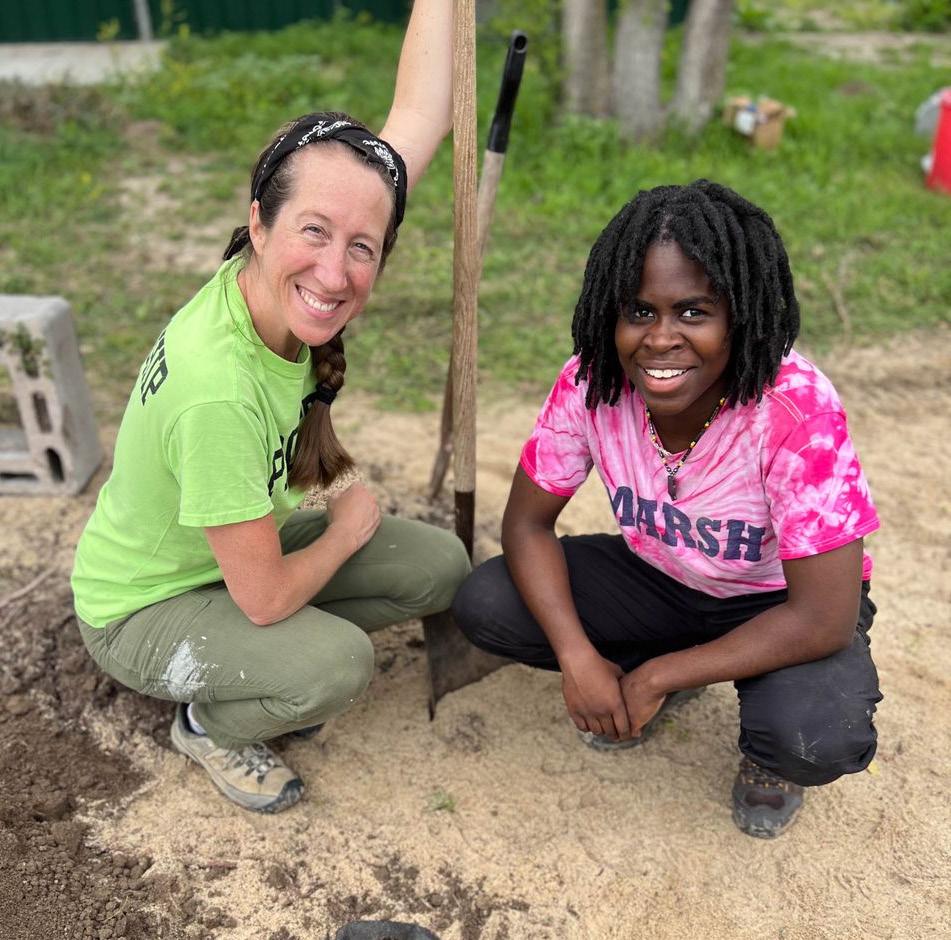
Stella and Sierra also spoke about their experience and what made them want to go back. Stella explained, “What made Rosebud so special is it’s such a different culture than what I’m used to and I really enjoyed it. I come from a place with a lack of diversity in cultures so it was really special to experience something different than my own. I enjoy doing hard work and helping people so doing that every day was so fun and I made a lot of new friends and connections along the way.”
Sierra added, “Their [Lakota] customs and traditions aren’t something that you just randomly get the opportunity to experience. We
Lori & Sierra
went to a sun dance and got to see parts of their culture that aren’t widely known. Getting to partake in things like a sweat lodge just gave me a perspective on how the Lakota Tribe lives. I love being helpful to people … and I would love to experience it again.”
After speaking to Lori, Stella, and Sierra, I’ve learned that the Rosebud service trip is more than just another service trip/volunteering opportunity. Twelve Proctor students will be leaving for Rosebud once again in June with history teacher Brian Didier and staff member Kara Hayes. Rosebud is an opportunity that is few and far between so for those who can go, definitely consider this and speak to Stella and Sierra about this unique opportunity.
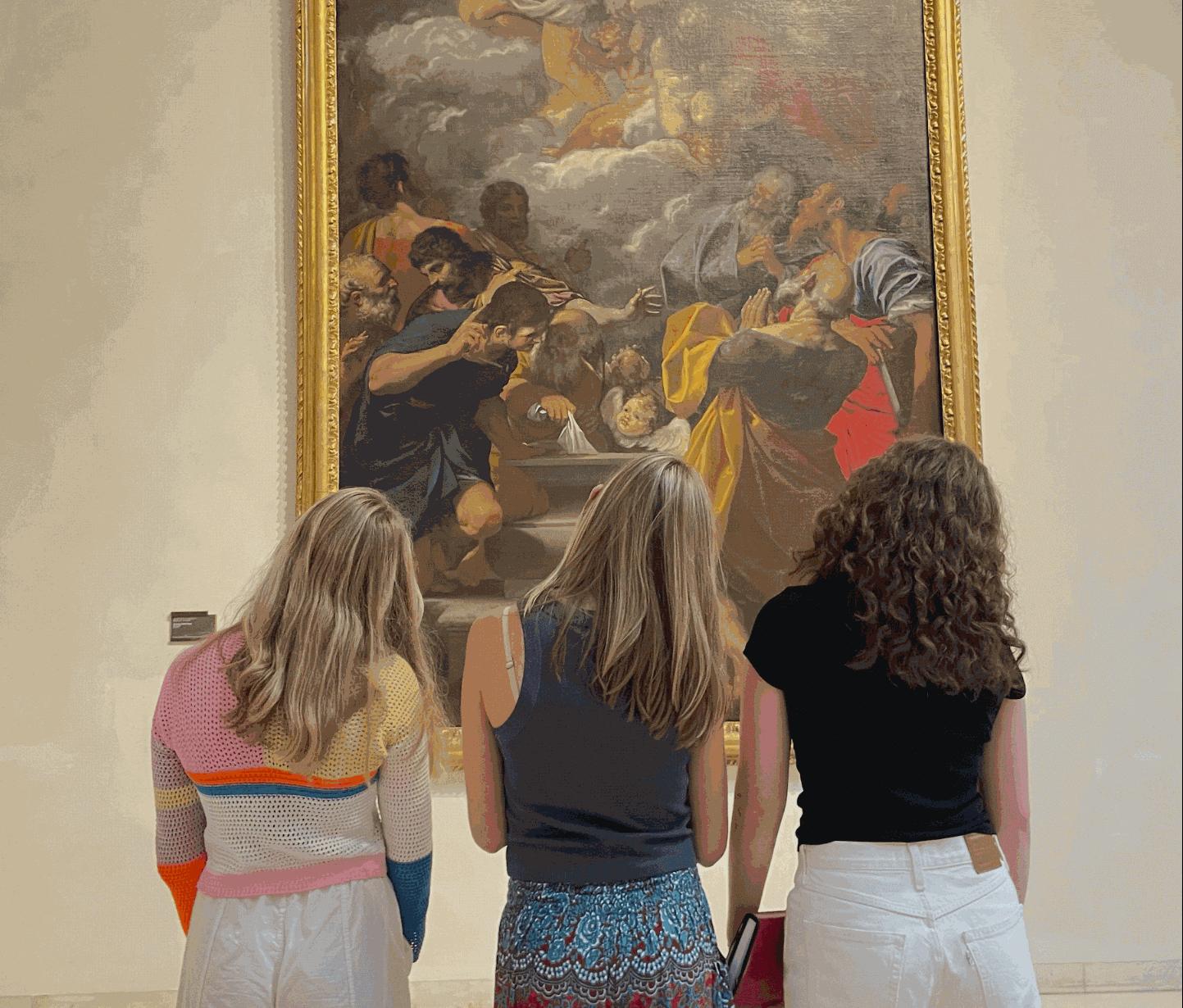
A once-in-a-lifetime experience is what I call European Art Classroom. Being able to live and explore France was a fulfilling way to spend the beginning of my senior year.
‘Euro’ changed me as an artist. I have experimented with different media to learn what I like the most, and oil paint has been proven quite difficult for me. In France, I had my skills put to the test. David Fleming, our teacher and artist, guided me and the group through countless oil paintings. I didn’t agree with his steps on how to start and finish a painting, but I learned to embrace them.
We also spent countless hours studying and staring at art made by the
greats. Learning that there are different ways to approach art makes you feel more comfortable with the style you pursue. One moment you can be looking at a piece made by Vincent Van Gogh with visible brush strokes and unique colors, then you can look at something realistic with dramatic lighting made by Carravagio. So after being immersed in all this creativity, how do I feel now as an artist back on campus?

I must be honest, when I returned oil painting was difficult. I had step-by-step instructions engraved into my brain on how to paint from start to finish. Now I’m not saying that I was forced to paint this way, it was just heavily implied that I should. Standing in Slocumb staring at my blank canvas, I felt stuck. “How should I go about this?” There were three artists who all taught their ways of painting….so who should I follow? Jill Jones Grotnes came over and observed that lots of Euro kids felt the same way when they came back like they were stuck on how to make their art.
I realized that I just needed to start the dang painting to see how it would end up. My painting revealed a glass of orange juice and a bagel. It ended up being one of the best paintings I have made. I used Dave’s advice on starting with the darkest colors and slowly adding in lights. I painted the background and main objects at the same time, there was no order to how things had to be completed.
I now feel the most confident I ever have making art. Instead of looking at a blank canvas, scared to pick up a brush, I just jump right in. These little steps not only help me but bring me back to the studio in France. I hear the music playing from the speaker and Dave telling us for the hundredth time to pause and step back.
Have you ever wondered where our Proctor water comes from? The answer is Bradley Lake right down the road. This year we have considered our water after the recent issues with lead, and my Epidemiology class with Sarah McIntyre visited Bradley Lake to learn about the water in Andover. I found the process of cleaning the water that we use at Proctor so interesting and wanted to share my knowledge with the community.
There are many factors to consider when thinking about water at Bradley Lake, the most important factor is whether the water is clean or not. I learned that every New Hampshire lake must be open to the public. There is a small beach at Bradley where people can swim. In an attempt to keep the water as clean as possible, there is a sign at the lake stating the rules of recreating. Some of the rules include no swimming on the southern side (where the pipe transporting the water is located), and what is prohibited: diapers, outboard motors over 30 horsepower, and dogs. Public access is another factor in managing our drinking water.
Norah (left) and Sally on Euro
The water is taken in from the lake and piped, using gravity, to the building where the lake water is transformed into clean drinking water. But how?
My Epidemiology class was given a tour of the treatment plant. In Sarah Mcintire’s class, we learned about the process of cleaning water with chlorine and caustic soda. We were interested in seeing how the water flows through many tanks to filter our campus water. The Andover plant has been up and running since 1909. Brandon Meier has been a part of the water district for over twenty years, Brandon has worked at Proctor since 2001 and is currently a part of the maintenance department as a Fleet Mechanic. He watched his dad run the plant during his childhood and has carried on his legacy of overseeing Andover’s clean water. Eighty percent of the water from the plant is used by Proctor, and the school has our own 200,000-gallon water tank behind Johnson as part of our system.
Even though water is one of the most basic necessities, it is expensive to keep it clean and drinkable. The machinery and equipment in the Andover plant are dated, ninety percent of the pipes are original. Two years ago Proctor was told that we wouldn’t have water for a short time. Brandon shared the reason. “When we couldn’t use water for two days, it was a single valve breaking. We didn’t have water all because of one little valve which cost almost $2,500 to replace.” Proctor and the center of Andover are dependent on this old
system that still works because of Brandon and a few volunteers. We were impressed by the complex systems in place and also surprised to learn of dated technology. It helped us understand the background when we face the recent water issues on campus.
I always wondered where our water comes from and now I know exactly where, and how it is cleaned. It makes me feel much better seeing how passionate Brandon is about the water and how hard he works. The next time you shower or fill up your water bottle, you may think about Brandon and the others who work there and everything they do to keep our water clean.

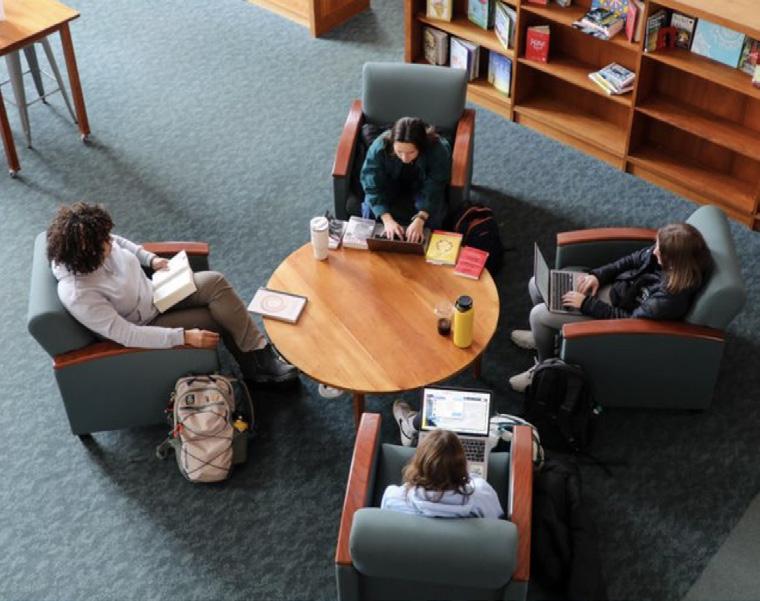
Finding a topic for a college essay can be one of the hardest tasks of high school. As a junior, I dread writing college essays and am stressed out of my mind. I hope my article can help other juniors feel more comfortable with this process.
I asked the current senior class in Culture and Conflict two questions. The first was, how did you finally decide on a topic to write on?
An anonymous senior explained, “As I began to brainstorm topics to write about, I allowed myself to free-write A LOT. I tried out many different topics, writing with low expectations and no judgment on the actual quality of writing. I would just free-write and see how I felt. Finally, I chose the topic that shined brighter than the rest. Ultimately, I went with my gut. Always listen to your gut!”
My second question asked for advice. “My advice for juniors starting their essay process is to try to have some fun with it and not put too much pressure on yourself to write the perfect essay or pick the perfect wording the first time around. There will be lots of time to change it...”
“It is also important to just start writing. Getting going can be the hardest part but the earlier you start, the better off you will be come fall, when you are back in classes and writing other supplementals. Write something that will represent yourself in multiple ways. Try to remember they are trying to get to know you as best as possible. Also, consider…what do I want THEM to know about ME.”
Source: College Essay Prompt from commonapp.org
To gain more information on the college essay, I first looked at Harvard’s website and Tips for the College Essay which includes being au-
Bradley Lake - not far from campus Proctor students in the Andover water treatment facilitiesthentic, being honest about your traits, showing not telling, paying attention to the requirements of the essay, and not being afraid to have drafts. The college essay is a chance to be you and tell your story. The College Essay Guy website advised us to read the essay out loud to improve flat text, write like a journalist, create a strong lead, proofread, and engage the reader’s imagination with the five senses.
The number one advice you’ll find everywhere is just be yourself.

The Proctor Academy Varsity Boys Lacrosse team team has had four different coaches in the last five years. When the current lacrosse team first got the news of Brendan Callahan being hired as the new coach, even though his resumé was decorated with college coaching experience, some returning team members were a bit ambivalent after so much turnover.
Callahan’s coaching prowess and experience is undeniable. Through his playing and early coaching career, “Coach Cal” was lucky enough to learn from and be coached by some well-known names in college lacrosse. Growing up in the Maryland/DC area, he has always been around lacrosse. Cal attended Gonzaga College High School in Washington DC: a highly respected program with a rich history of winning on the biggest stages of high school lacrosse. At Gonzaga, Cal had the privilege to be coached by Matt Rienzo who went on to coach at Notre Dame and Georgetown: two programs with lasting collegiate success.
After his time at Gonzaga, Cal earned the opportunity to play college lacrosse at Stony
Brook University. When Cal graduated from Stony Brook, he worked and coached as a graduate assistant at Lehigh then moved to second assistant coach, then defensive coordinator, and finally to recruiting coordinator. During his time at Lehigh Cal saw the program go from being ranked amongst the top fifty nationally to the top ten.
Cal has recently served seven years as the Head Coach at Dartmouth College, so I was interested in how he adjusted from college coaching to high school. He said, “Coaching is coaching; and, especially with the older kids that are here on campus, it’s not too different age-wise from the kids that I was working with before. I think the biggest shift has been all the things that happen around the team.”
When I asked about his biggest challenge coming into high school coaching, Cal talked about not getting as many reps through practice with his team as he is accustomed to. He noted, “But on the positive side, you get to know the kids a lot better.” The prep school coaching experience has been different, but he has embraced his amplified role in the lives of his players. Cal stresses building character and leadership into the team’s culture. “Just because you have a stick and a ball doesn’t mean
you get to turn in your homework late, or not be a nice person on campus. I think character wins games in the fourth quarter.”
A couple of weeks ago the boys lacrosse team took on a talented Cushing Academy squad. Tied, the game came down to the wire and in the final seconds, defender Cam Chambers picked up a ground ball in Proctor’s own half, ran the length of the field, and intuitively dumped the ball off to attackman Nolan Davis on the edge of the crease who snuck a shot behind the goalie as the buzzer sounded. The goal was truly something, but the beauty of the moment came after Nolan heaved his stick in the air and ran to the corner of the field where he was chased by every member of the team who came together into a full-on pile. Off to the side and among his players, Coach Cal celebrated.

Everyone at Proctor has a place they enjoy. I learned about why a few are special.

Norah Carlson ’24
“I’d say my favorite place on campus is probably the coffee house. I really like the environment, and I think that’s where I found Proctor’s ‘welcomingness.’ It’s a really chill space, so it’s kind of a step away from the chaos of a normal day, and I honestly enjoy the whole vibe.”
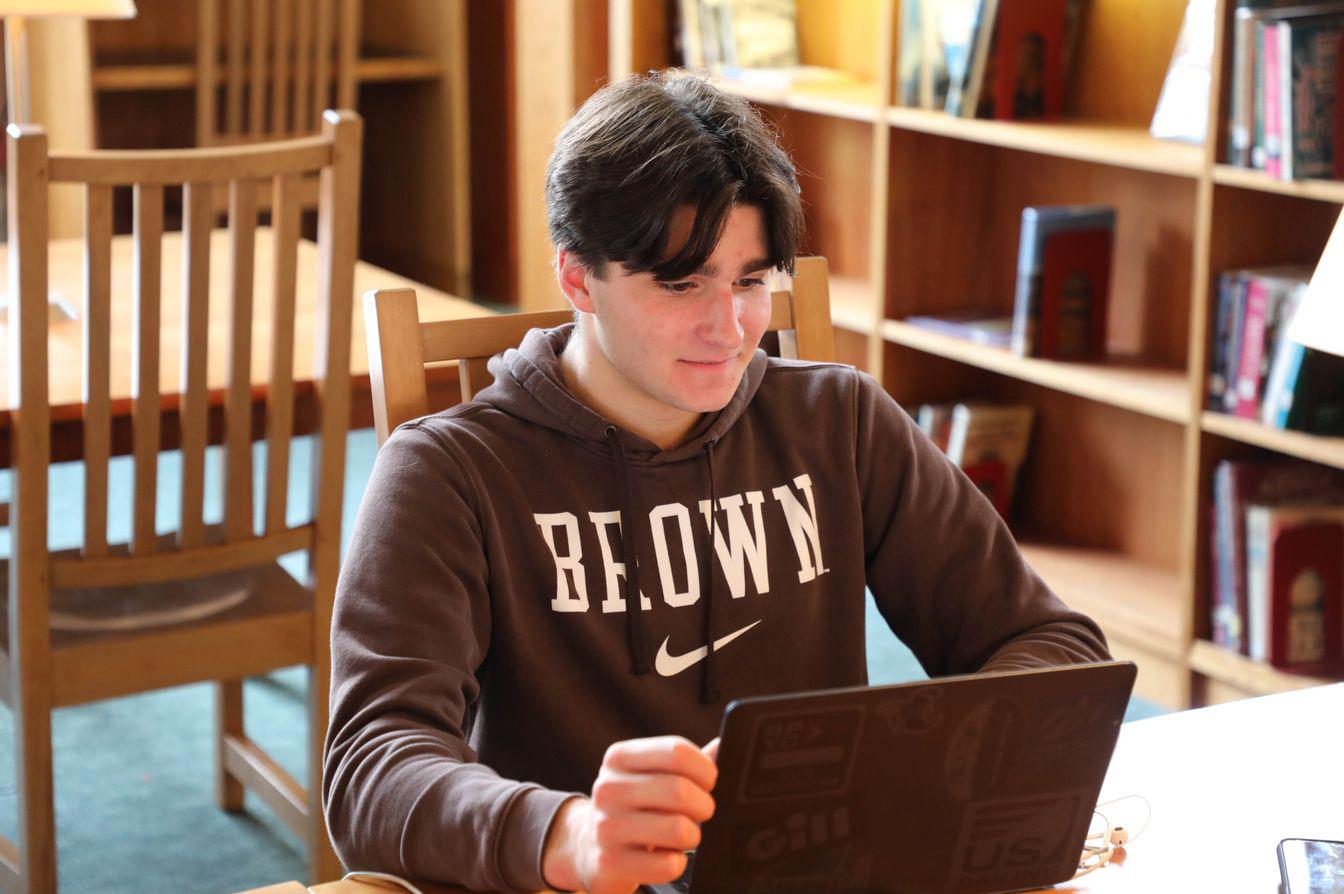
Chris Dakers ’25
“My favorite spot on campus is the library. Specifically, I like being at the cubicle desks. It’s my favorite place because it’s the quietest place where I can get all my work done; I can relax by myself, but if I want to socialize, all I have to do is turn around and go work at a table with someone else. I enjoy hanging out and messing around with friends when there.”

Ian Rosenshine ’25
“My favorite place on campus is the turf under the lights on a Saturday night when everyone is there. Playing games and blasting music, the word ‘together’ truly takes its meaning. Normally, the turf is not a fun place to be, but when everyone is together on the terrace hanging out, playing games, and talking, this is when I have the best time. Being able to jump around to different games and be in different conversations is what makes that time so special. I meet new people. I just get to run and get as much energy out as I want. In my junior fall, me and a bunch of my friends played soccer and tennis for about two hours while listening to music and having the best time. We then all sat down and had such a deep conversation where I learned so much about everyone. It’s those times that I will remember when I look back at why Proctor was so special to me.”
While conducting my interviews, I learned about different places on campus that students find special such as the outdoor center, the gym, and the dining hall. My favorite spot on campus is the swinging bridge.
In 2024, it is a fact that our phones and technology own us. Globally, people average six hours and fifty-eight minutes of screen time per day, according to Exploding Topics, a site tracking current trends. Is life passing us by while we stare at our phones?
In today’s world, we’re hooked on our gadgets like never before. Screens glow constantly, notifications beckon, and we’re so lost in our phones that we often forget to look up and see what’s happening around us. I experience this in my day-to-day life as well as in all of my classes, when I have the urge to pick up my phone and watch others on their phones. We spend more time on our phones than we do socializing with one another.
My Anatomy and Physiology class has an issue with phone usage. Our teacher Kelly Griffin-Brown is constantly telling us to put our phones away. She said, “It’s incredibly distracting to the lesson at hand and you can’t be paying attention and have your phone out at the same time. As a teacher, it is super frustrating because you know [students] are missing half the things I’m saying.”
One of the members of that class is Jodie Gratton ‘24. When asked about her personal daily phone usage, she said, “It is like six or eight hours. I spend most of my time checking social media, and I text my
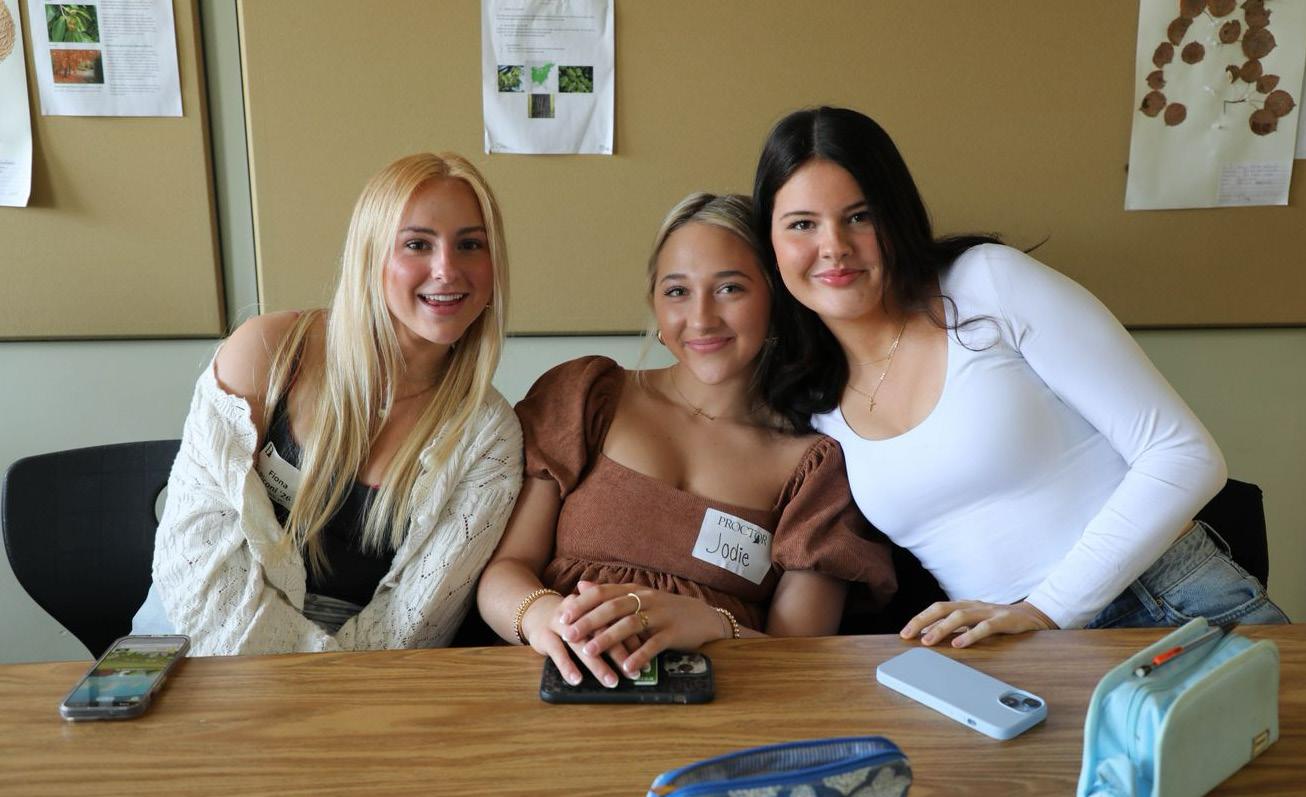
family a lot.”
During our conversation, she explained, “You don’t really think about it until someone brings it up and mentions it, and … okay yeah, I am really always on my phone, but I don’t realize it because it’s such a habit and it’s just stuck in your routine.” This is the problem with phones. Everything we do is habitual, whether it’s good or bad.
Why are we so addicted to our phones in the first place? Not going to bore you to death with a lot of science so I’ll make it simple and quick. According to lemonade.com, it starts with a tiny molecule in our brain called dopamine. And when you are on your phone doing things that make you feel good, your brain is releasing dopamine. Dopamine is a neurotransmitter in your brain that makes you feel good. It is released every time we do something that meets a survival need, like eating and having sex. So, the more we use our phones, our brain starts to notice a pattern. Our brain eventually associates phones with dopamine and this is where the habit is formed. And since our brain naturally craves dopamine hits, it sees your phone as an easy dopamine hit.
I asked Jodie if lots of phone usage has affected her relationships. She said, “I think they can change your relationship in a way if you’re just so tuned into your phone and you’re with a group of friends and you’re not tuned into them and you’re just missing out on genuine moments with your friends and family. Sometimes I’ll be hanging with my friend and we’ll just be sitting on the couch and won’t even be talking and just on our phones. Then I think about it and I’m like, ‘We just sat here for ten minutes on our phones.’”
Hearing Jodie talk about missing out on gen-
uine moments with friends makes me think back to the days when I was younger. I would run to my neighbor’s house to see if my friends could play and our interactions just felt so natural and fun. There was no texting to hang out, at least for me. When I was hanging out with friends, it was the most fun thing in the world. Playing on the playground, jumping off of the swings, going swimming in the summer, and playing Wii. It just felt so real. Some of us had devices back then, but they weren’t in our lives like they are today. You see how times have changed so much. I just wish we could go back to the times like that. But I don’t think we will ever be able to go back, and in fact, it will just keep getting worse.
Why will it keep getting worse? Jodie added, “I think with phones, they show you what you want to see, so then you just get sucked in and
it’s just like a downward spiral.” One of the main things we are doing on our phones is social media. These social media companies’ goal is to make the most revenue possible. The longer you are on the app the more money they make. These apps show you content that they know you will like and this keeps you on the app. These companies are all switching to a TikTok/reel style of entertainment and our attention spans have shortened, so this is why reel content is so popular. Quick hits of dopamine keep us on the app and they continue to throw content our way that they know we like. It’s honestly crazy how many people aren’t aware of this as I only learned about this a couple of months ago.
Jodie is very aware of her phone usage. I asked her if she had ever just tried to put the phone down at times and take a break from it. “Yeah, I try when I’m with family, I try and always put my phone down and not go on it as much. Especially when I’m with my grandparents. My grandparents will always say to me, ‘You’re always on that phone.’ Because they grew up in a different time. And so when I’m with them I try not to go on my phone at all because I feel like when you’re with the closest people in your life and people you care about, you can’t miss out on opportunities to make memories with them.”
Excessive phone usage is not by any means the worst thing there is going on in this world. Becoming aware of it and noticing its patterns can improve our lives in many aspects like interactions with others, anxiety levels, and just your peace of mind. Precious moments are just passing you by while you stare at a screen.
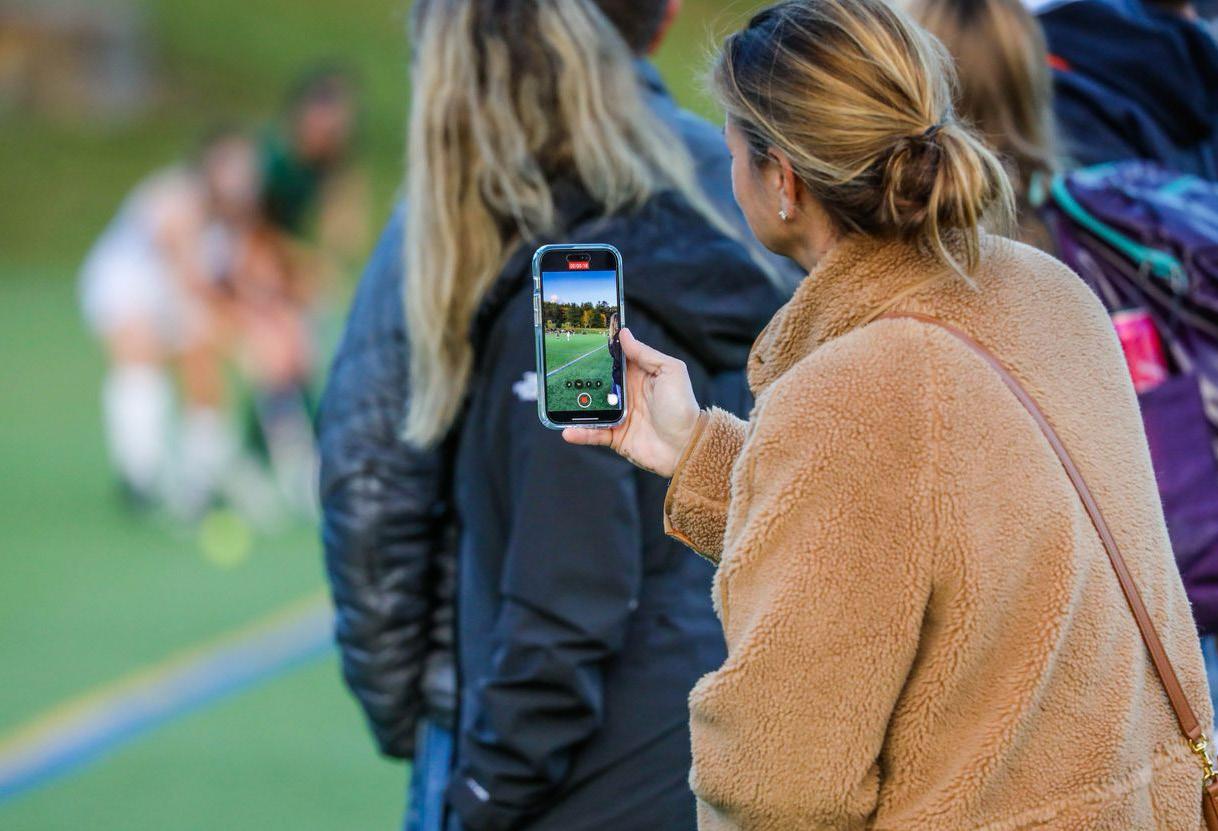

“Thank you, Peter, for all of the energy you have poured into the Hornet’s Nest over the past decades. Your appreciation for the student voice and willingness to elevate the opinions, perspectives, and voices of our students are so very much appreciated! We will miss you, but will make sure your commitment to this student newspaper lives on!”